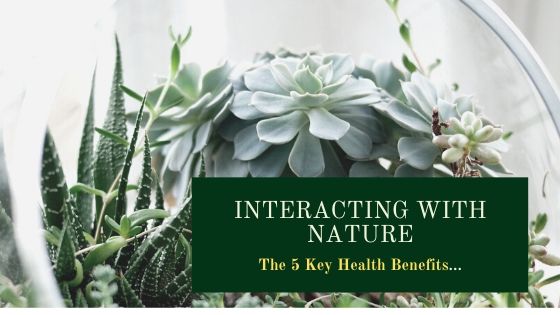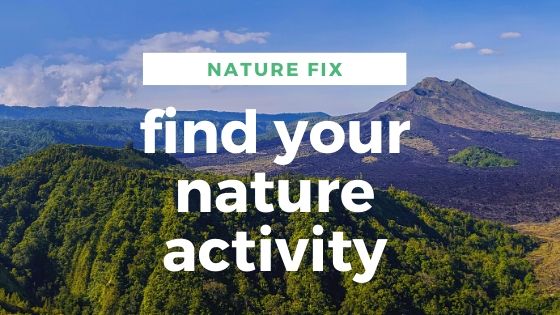The 5 Key Health Benefits of Interacting with Nature

Why is ‘Interacting with Nature’ good for your health & well being?
This question has been the subject of much research lately, and researchers are finding that ‘interacting with nature’ is not only good for your personal health – it, can also improve the quality’ of your life.
You may have some knowledge that access to outdoor nature settings can reinvigorate you or make you feel energized. And yes, it can help you recover from stress symptoms or mental fatigue or help you to ‘clear your head’ so to speak.
However, not everyone has access to green space and natural areas – as, you may be residing in suburbia where green space is limited, or you are confined to an urban concrete jungle. This doesn’t mean you are extinct from the well-being experience.
If you fit into this category, you could either bring nature in (e.g. through plants, flowers, etc) or seek out and regularly visit a local community garden – or, maybe you’ve already been proactive and started your own veggie patch or allotment. This tact can become vital in terms of giving you an escape route from the daily routine and help you to escape from your everyday stressors or even illness symptoms.
In fact, some studies point out that indoor settings with green fauna or visible leafy plants, or even urban areas with some leisure areas and green-space - such as, a community garden can also have positive effects. Indeed, some of research conducted in hospitals, offices and schools concluded that even placing a plant in a room can help to change mood or have a positive impact on stress or anxiety. [1, 2]
In a similar vein, many studies indicate that millions of people are going throughout the day with minimal exposure time to the fresh air or natural sunlight. Subsequently, they’re often missing out on natural forming vitamins such as Vitamin D (known as the sunshine vitamin). Many too, are spending far too much time behind the technology screens or spending heavily on human-made-supplements to replenish the deficit.
Fortunately, there’s mounting research evidence highlighting why interacting with nature can deliver a range of measurable health and well being benefits to you. Particularly, in terms of psychological, cognitive, and physiological benefits too. So, what are these 5 key health benefits?
Let us explore them in more depth.
Health Benefit of Nature 1. - Psychological Benefits
Interacting with nature can have a positive effect on your mental processes, and it can lead to improved brain function & reduced anger or frustration. Additionally, there can be reduced anxiety and an improvement in mood and behavior - as well as increased self-esteem.
From a brain cognitive perspective, experiencing nature can have a positive effect on cognitive ability or function and lead to attention restoration or reduced mental fatigue. Another benefit well noted amongst the studies is the improved ability to perform tasks, productivity, and improved academic performance.
According to Professor Azadeh Aalai, an assistant professor of Psychology at Queensborough Community College in New York - a simple walk in nature is good for the brain and good for the spirit. Professor Aalai cited a study by Reynolds (2015) who wrote;
“A walk in the park may soothe the mind - and, in the process, change the workings of our brains in ways that improve our mental health, according to an interesting new study of the physical effects on the brain of visiting nature”.
In short, nature experiences can change the structural plasticity of the brain. As, environmental or nature exposures provides an ability to form new neural connections, which in turn allow the brain to rewire itself.
Study findings also demonstrate other cognitive and effective health benefits for individuals who may be suffering from stress, anxiety, or depression – as, it can be useful clinically as a supplement to existing treatments. In short, nature plays a silent part in calming the mind and enriching one’s mental health and well being. [3, 4, 5]
In one research study on comparing the brain activity of healthy people after they walked for 90 minutes in either a nature setting or an urban one – findings, indicated that those who did a nature walk had lower activity in the prefrontal cortex of the brain and were less prone to negative thinking patterns and emotions. [6]
Health Benefit of Nature 2 - Physiological Benefits
Getting a regular ‘nature fix’ so to speak, has other positive benefits – as, it can have a positive effect on your physical functioning and, subsequently your physical health. Interestingly, there is something about just being outdoors that changes the physical expression of stress in the body.
Once again, studies have shown that stressful states of mind can be relieved and decreased by nature therapy. For instance, studies have shown that there can be reduced blood pressure, stress reduction and reduced cortisol levels (e.g. known as the bad or harmful stress hormones).
Similarly, there can be a reduced occurrence of illness, and a person can achieve a perception of greater health and well being – as, well as faster healing times; reduced stress related headaches; and cardiovascular or respiratory disease.
Many studies have concluded that outdoor activity which is conducted in a natural or green environment causes greater feelings of revitalization and positive engagement and has a positive impact on mood and self-esteem.
Although, the immediate psychological health benefits of exercise activity are well known, participating in green exercise activities can also lead to other positive physiological outcomes. These include included a steadier heart rate, reduced blood pressure – and post-exercise blood pressure returns to baseline values more quickly after exercising in front of rural scenes compared to urban settings [7].
Due to the increased interest on the effects of the environment on personal health, many global studies have developed.
For instance, a study conducted by Park, et.al. in Japan looked at the evidence from taking in or bathing in nature forest atmosphere within 24 forests. They found that the physiological effects associated with these activities could lower concentrations of cortisol, lower pulse rate, lower blood pressure, increase parasympathetic nerve activity, and lower sympathetic nerve activity compared with city settings. Further suggesting that it can also aid in effectively relaxing the human body. [8]
Health Benefit of Nature 3 - Social Benefits
What also appears to feature strongly among peer-reviewed studies. Is that, interacting with nature can positively influence behavior; improve social skills and connections; and facilitate social interaction and greater cohesion.
Studies have shown that a nature fix can lead to a positive effect on individuals and the community through reduced crime rates and violent acts. It also enables social empowerment and increases social support.
Besides the fact that nature settings can connect us all to a sense of place, even urbanized community gardens can also evoke strong feelings of ownership – as, many urban dwellers often spend a considerable amount of time there. In many instances, these types of settings may act as meeting places, or a place for family gatherings, to acting as an important stepping-stone in providing a social connection with others.
In a study conducted by Shinew, et.al. – they found that leisure and community garden spaces in urbanized areas have the added benefit for greater social contact or even interracial interaction. [9]
Unfortunately, in today’s modern technological society, children are spending an increased amount of time indoors and many will experience nature deficit disorder. According to studies, an average American child is spending nearly 8 hours, or a total of 53 hours indoors each week, and researcher Louv describes the human costs of alienation from nature activities as;
“diminished use of the senses, attention difficulties and higher rates of physical and emotional illness” [p. 36].
In contrast, other more positive trends are showing that outdoor nature-based interactions have the potential of nurture a child’s development cognitively, socially, emotionally, and physically.
He further states that children’s education and development can be greatly enhanced through activities outside and in nature settings – as, it also provides an opportunity for children to interact with others (e.g. friends, parents, siblings, and peers) without the school structure and learn within a play environment. And one that can help build self-esteem, confidence and develop or sustain family bonding or friendships. (10, 11].
Health Benefit of Nature 4 - Spiritual Benefits
It may be one of the benefits that people tend to ignore or dismiss, but there can also be positive spiritual well being effects. For instance, becoming grounded in nature related events or settings can increase spiritual connectedness and increase inspiration and creativity. It can also help you to rejuvenate, revive, or re-center or ground you.
I like the well-known quote from Mary Davis as it speaks volumes – when she stated, “A walk in nature walks the soul back home.” Put simply, even a gentle walk through a park or nature reserve can be good for the soul.
Therefore, finding ways to increase your spiritual connection to the natural world can be very fruitful and assist you to find your true ‘inner self.’
Whether it’s going for a walk in a park or along the beach, to camping under the night sky – you can connect with the majesty of nature in its true form. Maybe, you like being close to or just observing animals, birds, trees, fauna or walking within a flower garden – its, all beneficial in some silent way. Particularly when you strive to feel their presence.
In a recent article presented to Mindfood - family physician and mental health specialist Dr Winfried Sedhoff who has attained over 25 years of clinical experience explains that connecting with the spirit of nature is a powerful and vital tonic in life.
He further says that connecting with nature helps to find our real identity and it can be our guide or doorway to a better life – as, it reminds us of our ultimate priorities.[12]
Health Benefit of Nature 5 - Healing Benefits
If people are experiencing an illness or disease – something special happens when people spend time in nature settings. For instance, besides the fact that it can become clinically therapeutic, it also induces a state of ‘physiologic relaxation’.
It’s well proven that people who have a close connection to the environmental or nature landscapes are happier from the inside – as, they indulge more in positive thinking and enhance their coping and healing mechanisms.
Sadly, many researchers have indicated that a large chunk of the population today is deficient of the ‘sunshine vitamin’ - which explains the massive increase in fatal diseases in today’s modern world. Millions of people would also rather rely on human-made supplements, to replenish any nature related deficit.
Studies are plentiful where it comes to how nature experiences offer its own medicine. As an example - a Nippon Medical School research study led by Professor Qing Li in Tokyo, found that trees and plants emit aromatic compounds called ‘phytoncides’ that, when inhaled, can spur healthy biological changes in the body.
Phytoncides are known to increase the number of natural killer (NK) cells. This is a type of white blood cell that supports the immune system and is associated with many other health and healing benefits.
In his studies, Professor Li has shown that when people walk through or stay overnight in forests, they inhale these compounds and they often exhibit changes in the blood that are associated with protection against cancer, better immunity and lower blood pressure.
In addition, NK cells also assist the body to combat infections and autoimmune disorders; they lower inflammation (e.g. a main cause of disease); and lower the risk of heart disease or cancer.
Researchers also found that people who took two long walks through forests on consecutive days increased their NK cells by 50 per-cent and the activity of these cells by 56 per-cent – plus, a month later, their NK cell activity levels still remained 23% higher than usual.
In another study, published in the Journal of Environmental Health Perspectives – its report concluded that women living in areas with a lot of vegetation had a 12% lower risk of death from all causes compared with people in the least green places. [13]
In closing, ‘interacting with nature’ is undoubtedly the best healer – as, in terms of the human-nature relationship its practice can provide greater emotional balance, and an overall resilience to everyday life problems.
Health Benefits of Interacting with Nature - In Summary
The research is incredibly positive when it comes to the health and wellbeing benefits of interacting with nature.
So, whether you’re feeling overwhelmed with everyday life routines or stressors; recovering from an illness; or your feeling mentally fatigued. Taking some time aside in your life to plan an outdoor nature excursion – be it a simple walk through the park or sitting on a bench overlooking an ocean or lake can refresh both the brain, the body, and the spirit.
But, just as important is that it has incredible ‘healing powers.’
According to Dr. Strauss its important to plan and make nature interactions part of your normal everyday lifestyle. He further states.
"Anything from 20 to 30 minutes, three days a week, to regular three-day weekends in the woods is helpful - You, can even try to combine your nature outings with your regular exercise by power walking or cycling outdoors."
Although the type of interacting with nature experience you choose doesn’t really matter too much, Dr. Strauss says.
"Focus on places you find the most pleasing - the goal is to get away from stimulating urban settings and surround yourself with a natural environment.

Article References
1. Han, K. (2009). ‘Influence of limitedly visible leafy indoor plants on the psychology, behaviour, and health of students at a junior high school in Taiwan’. Environmental Behaviour; Vol. 41, pp. 658 - 692.
2. Maas, J., et. al. (2007). ‘Green space, urbanity, and health: How strong is the relation?’ Journal of Epidemiology - Community Health. Vol.60, pp.587-592.
3. Aalai, A. (2015). 'Walk in Nature: good for brain, good for spirit. How can the brain benefit from nature?' Psychology Today. Blog article cited online at https://www.psychologytoday.com/intl/blog/the-first-impression/201508/walk-in-nature-good-brain-good-spirit. Posted Aug 20, 2015.
4. Reynolds, G. (2015). ‘How walking in nature changes the brain’. The New York Times. Retrieved on August 20th, 2015 from: http://well.blogs.nytimes.com/2015/07/22/how-nature-changes-the-brain/?r=0.
5. Berman, M.G., et.al. (2012). ‘Interacting with nature improves cognition and affect for individuals with depression.’ Journal Affective Disorder. November, Vol. 140, (3), pp. 300 -305.
6. Harvard Health Publishing (2018). 'Sour mood getting you down? Get back to nature.’ Harvard Health Publishing. Article cited online at https://www.health.harvard.edu/mind-and-mood/sour-mood-getting-you-down-get-back-to-nature. Published: July, 2018.
7. Pretty, J., et.al. (2005). ‘The mental and physical health outcomes of green exercise.’ International Journal of Environmental Health Research; Vol. 15, (5), pp.319-337.
8. Park, B., et.al. (2010) ‘The physiological effects of Shinrin-yoku (taking in the forest atmosphere or forest bathing): evidence from field experiments in 24 forests across Japan’. Environmental Health Preventative Medicine: Vol. 15, (1), pp.18-26.
9. Shinew, K.J., Glover, T.D., & Parry, D.C. (2004). ‘Leisure spaces as potential sites for interracial interaction: community gardens in urban areas.’ Journal of Leisure Research. Vol. 36, pp. 336-355.
10. Coyle, K. J. (2010). ‘Back to school: back outside! How outdoor education and outdoor school time create high performance students’. National Wildlife Federation, pp.1-41.
11. Louv, R. (2008). ‘Last child in the woods: Saving our children from nature-deficit disorder’. Chapel Hill: Algonquin Books.
12. Sedhoff, W. (2020). ‘5 ways to enhance your spirituality and connect with nature’. Mindfood Media. Online Article cited at https://www.mindfood.com/article/5-ways-to-enhance-your-spirituality-and-connect-with-nature/. April 26, 2020.
13. Sifferlin, A. (2016). ‘The healing power of nature’. Time Magazine. Online article cited at https://time.com/4405827/the-healing-power-of-nature/. Published July 14, 2016.

